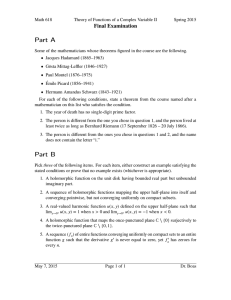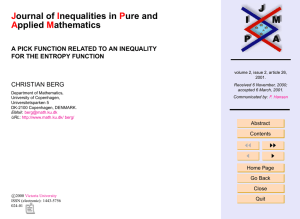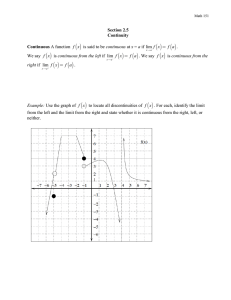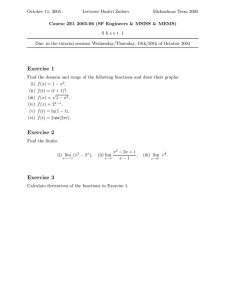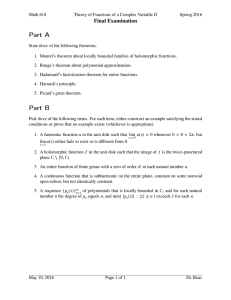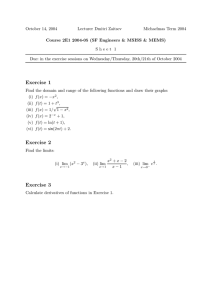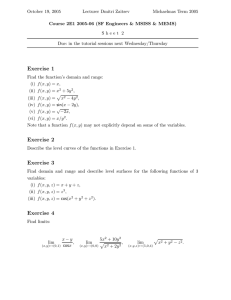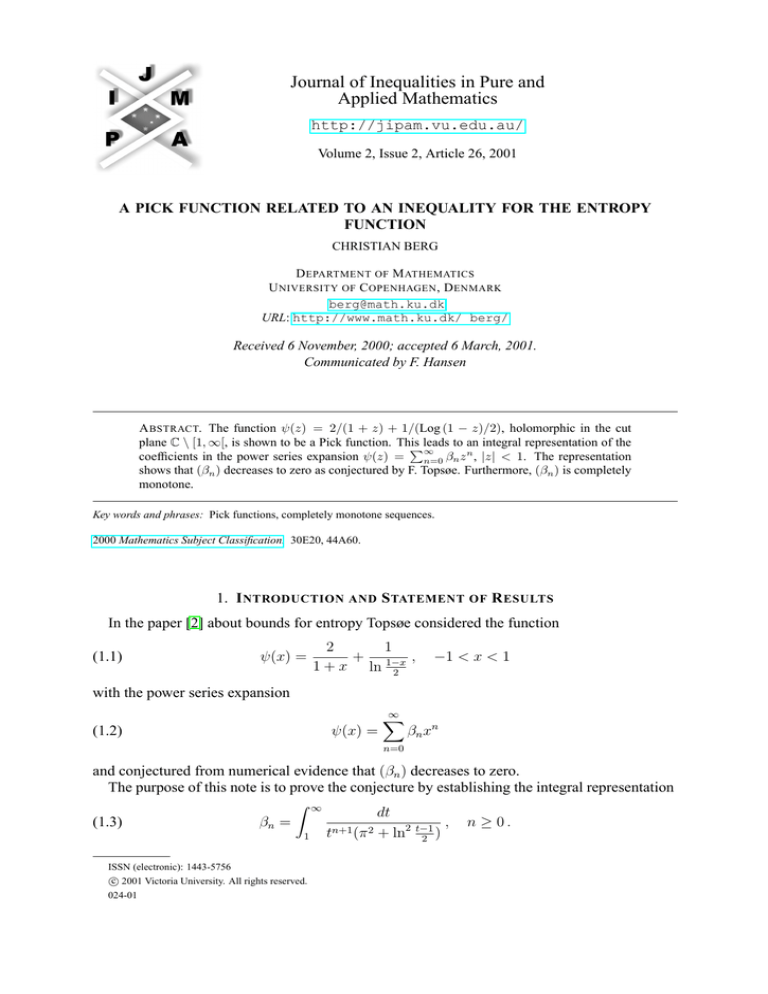
Journal of Inequalities in Pure and
Applied Mathematics
http://jipam.vu.edu.au/
Volume 2, Issue 2, Article 26, 2001
A PICK FUNCTION RELATED TO AN INEQUALITY FOR THE ENTROPY
FUNCTION
CHRISTIAN BERG
D EPARTMENT OF M ATHEMATICS
U NIVERSITY OF C OPENHAGEN , D ENMARK
berg@math.ku.dk
URL: http://www.math.ku.dk/ berg/
Received 6 November, 2000; accepted 6 March, 2001.
Communicated by F. Hansen
A BSTRACT. The function ψ(z) = 2/(1 + z) + 1/(Log (1 − z)/2), holomorphic in the cut
plane C \ [1, ∞[, is shown to be a Pick function. This
to an integral representation of the
Pleads
∞
n
coefficients in the power series expansion ψ(z) =
β
n=0 n z , |z| < 1. The representation
shows that (βn ) decreases to zero as conjectured by F. Topsøe. Furthermore, (βn ) is completely
monotone.
Key words and phrases: Pick functions, completely monotone sequences.
2000 Mathematics Subject Classification. 30E20, 44A60.
1. I NTRODUCTION AND S TATEMENT OF R ESULTS
In the paper [2] about bounds for entropy Topsøe considered the function
(1.1)
ψ(x) =
2
1
+ 1−x ,
1 + x ln 2
−1 < x < 1
with the power series expansion
(1.2)
ψ(x) =
∞
X
βn xn
n=0
and conjectured from numerical evidence that (βn ) decreases to zero.
The purpose of this note is to prove the conjecture by establishing the integral representation
Z ∞
dt
, n ≥ 0.
(1.3)
βn =
n+1
2
t (π + ln2 t−1
)
1
2
ISSN (electronic): 1443-5756
c 2001 Victoria University. All rights reserved.
024-01
2
C HRISTIAN B ERG
This formula clearly shows β0 > β1 > · · · > βn → 0. Furthermore, by a change of variable we
find
Z 1
ds
βn =
sn
, n ≥ 0,
2
s(π + ln2 1−s
)
0
2s
which shows that (βn ) is a completely monotone sequence, cf. [3].
The representation (1.3) follows from the observation that ψ is the restriction of a Pick function with the following integral representation
Z ∞
dt
, z ∈ C \ [1, ∞[ .
(1.4)
ψ(z) =
2
(t − z)(π + ln2 t−1
)
1
2
From (1.4) we immediately get (1.3) since βn = ψ (n) (0)/n!.
2. P ROOFS
A holomorphic function f : H → C in the upper half-plane is called a Pick function, cf. [1],
if Im f (z) ≥ 0 for all z ∈ H. Pick functions are also called Nevanlinna functions or Herglotz
functions. They have the integral representation
Z ∞
t
1
(2.1)
f (z) = az + b +
−
dµ(t) ,
t − z 1 + t2
−∞
where a ≥ 0, b ∈ R and µ is a non-negative Borel measure on R satisfying
Z
dµ(t)
< ∞.
1 + t2
It is known that
(2.2)
a = lim f (iy)/iy , b = Re f (i) , µ = lim+
y→∞
y→0
1
Im f (t + iy)dt ,
π
where the limit refers to the vague topology. Finally f has a holomorphic extension to C\[1, ∞[
if and only if supp (µ) ⊆ [1, ∞[.
Let Log z = ln |z| + i Arg z denote the principal logarithm in the cut plane
C\] − ∞, 0], with Arg z ∈ ]−π, π[. Hence Log 1−z
is holomorphic in C \ [1, ∞[ with z = −1
2
as a simple zero. It is easily seen that
(2.3)
ψ(z) =
2
1
+
,
1 + z Log 1−z
2
z ∈ C \ [1, ∞[
is a holomorphic extension of (1.1) with a removable singularity for z = −1 where ψ(−1) =
1/2. To see that V (z) = Im ψ(z) ≥ 0 for z ∈ H it suffices by the boundary minimum principle
for harmonic functions to verify lim inf z→x V (z) ≥ 0 for x ∈ R and lim inf |z|→∞ V (z) ≥ 0,
where in both cases z ∈ H.
We find
x ≤ 1 (with ψ(1) = 1)
ψ(x) ,
lim ψ(z) =
z→x
2 + x−11
,
x>1
1+x
ln
−iπ
2
hence
lim V (z) =
z→x
J. Inequal. Pure and Appl. Math., 2(2) Art. 26, 2001
x≤1
0,
π
π 2 +ln2
x−1
2
,
x > 1,
http://jipam.vu.edu.au/
A P ICK F UNCTION R ELATED
TO AN I NEQUALITY FOR THE
E NTROPY F UNCTION
3
whereas lim|z|→∞ ψ(z) = 0. This shows that ψ is a Pick function, and from (2.2) we see that
a = 0 and µ has the following continuous density with respect to Lebesgue measure
x≤1
0,
d(x) =
2
,
x > 1.
1 π + ln2 x−1
2
Therefore
∞
dt
1
t
ψ(z) = b +
−
.
2
2
t − z 1 + t π + ln2 t−1
1
2
In this case we can integrate term by term, and since limx→−∞ ψ(x) = 0, we find
Z ∞
dt
ψ(z) =
(t − z)(π 2 + ln2 t−1
)
1
2
Z
and
8 ln 2
b = Re ψ(i) = 1 − 2
=
π + 4 ln2 2
which establishes (1.4).
Z
∞
1
tdt
(1 + t2 )(π 2 + ln2
t−1
)
2
,
R EFERENCES
[1] W.F. DONOGHUE, Monotone Matrix Functions and Analytic Continuation, Berlin, Heidelberg,
New York, 1974.
[2] F. TOPSØE, Bounds for entropy and divergence
two-element set, J. Ineq. Pure And Appl. Math.,
http://jipam.vu.edu.au/v2n2/044_00.html
for distributions over a
2(2) (2001), Article 25.
[3] D.V. WIDDER, The Laplace Transform, Princeton 1941.
J. Inequal. Pure and Appl. Math., 2(2) Art. 26, 2001
http://jipam.vu.edu.au/

